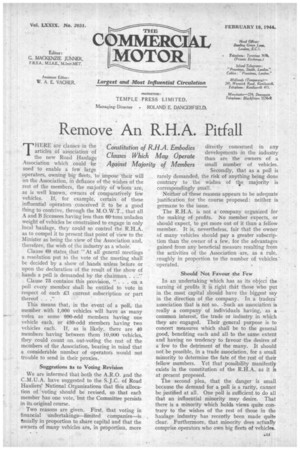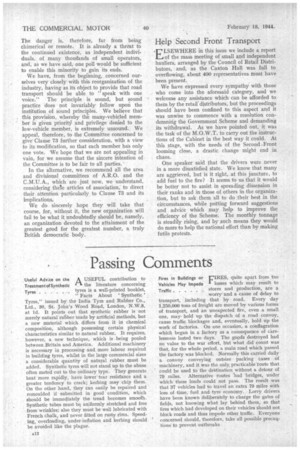Remove An R.H.A. Pitfall
Page 13

Page 14

If you've noticed an error in this article please click here to report it so we can fix it.
T . HERE are clauses in the articles of association of the new Road Haulage Association which could -be used to enable a feW large operators, owning big fleet, toimpose 'their will on the Association, in defiance of the Wishes of the rest of the members, the majority of whom are, as is well known, owners of comparatively few vehicles. If, for example, certain of these influential operators conceived it to be a good thing to contrive, through the M.O.W.T., that all A and B licensees having less than 60 tons unladen weight of vehicles be constrained to engage in only local haulage, they could so control the R.H.A. as to compel it to present that point of 'view to the Minister as being the view of the Association and, therefore, the wish of the industry as a whole: Clause 69 states that• "At all general meetings a resolution put to the vote of the meeting shall be decided by a show of hands unless before or upon the declaration of the result of the show of hands a poll is demanded by the chairman . . ."
Clause 73 contains this provision, " . . . on a poll every member shall be entitled to vote in respect of each £1 current subscription or part thereof . . ."
This means that, in the event of a poll, the member with 1,000 vehicles will have as many votes as some 990-odd members having one vehicle each, or 450-odd members having two vehicles each. If, as is likely, there are 40 members having between them 10,000 vehicles, they could count on out-voting the rest of the members of the Association, bearing in mind that a considerable number of operators would not trouble to send in their proxies.
Suggestions as "to Voting Revision We are informed that both the A.R.O. and the C.M.U.A. have suggested to the S. IC. of Road Hauliers' National Organizations that this allocation of voting should be' revised, so that each member has one vote, but the Committee persists in its original course.
Two reasons are given. First, that voting in financial undertakings—limited companies—is rtsually in proportion to share capital and that the owners of many vehicles are, in proportion, more developments in the industry developments in the industry Clauses Which May Operate than are the owners of a Against Majority of Members small number of vehicles. • Secondly, that as a poll is rarely demanded, the risk of anything being done contrary to the wishes of ttie majority is correspondingly small. Neither of these reasons appears to be adequate justification for the course proposed : neither is germane to the issue. The R.H.A. is not a' company organized for the making of profits. No member expects, or should expect, to get more out of it than a fellow member. It is, nevertheless, fair that the owner of many vehicles should pay a greater subscrip tion than the owner of a few, for the advantages gained from any beneficial measure resulting from the activities of the Association -are, as a rule, roughly in proportion to the number of vehicles operated. Should Not Favour the Few In an undertaking which has as its object the earning of profits it is right tha't those who put in the most capital should have the biggest say in the direction of the company. In a traders' association that is not so. -Such an association is really a company of individuals having, as a common interest; the trade or industry in which they are engaged. Their general purpose is to concert measures which shall be to the general good, benefiting each and all to the same extent and having no tendency to favour the desires of a few to the detriment of the many. It should not be possible, in a trade association, for a small minority to determine the fate of the rest of their fellow members. Yet that possibility manifestly exists in the constitution of the R.H.A. as it is at present proposed.
The second plea, that the danger is small because the demand for a poll is a rarity, cannot be justified at all. One poll is sufficient to do all that an influential minority may desire. That there is a minority which holds views quite contrary to the wishes of the rest of those in the haulage industry has recently been made quite clear. Furthermore, that minority does actually comprise operators who own big fleets of vehicles. The danger is, therefore, far from being chimerical or remote. It is already a threat to the continued existence, as independent individuals, of many thoulands of small operators, and, as we have said; one poll would be sufficient to enable this minority to gain its ends.
We have, from the beginning, concerned ourselves very closely with this reorganization of the industry, having as its object. to provide that road transport should be able to "speak with one voice." The principle is sound, but sound practice does not invariably follow upon the institution of sound principles. We believe that this provision, whereby the many-vehicled mem ber is given priorq and privilege denied to the low-vehicle member, is extremely unsound. We appeal, therefore, to the Committee concerned to give. Clause 73 further consideration, with a view to its modification, so that each member has only one vote. 'We hope that we are not appealing in vain, for we assume that the sincere intention of the Committee is to be fair to all parties.
In the alternative, we recommend all the area and divisional committees of A.R.O. and the C.M.U.A., which are just now, we understand, considering thee articles of association,' to direct their attention particularly, to Clause 73 and its implications.
We do sincerely hope they will take that course, for, without it, the new organization will fail to be what it undoubtedly should be, namely, an organization devoted to the attainment of the greatest gclod for the greatest number, a truly British democratic body.
Help Second Front Transport
ELSEWHERE in this issue we include a report ELSEWHERE the mass in of small and independent hauliers, arranged by the Council of Retail Distributors, and, as the Caxton Hall was full to overflowing, about 400 representatives must have been present.
We have expressed every sympathy with those who come into the aforesaid category, and we welcome any assistance which can be afforded to them by the retaildistributors, but the proceedings should have been confined to this aspect and it was unwise to commence with a resolution condemnifig.the Government Scheme and demanding its withdrawal. As we have pointed out, it was the task of the M.O.W.T. to carry out the instructions of the Cabinet in the best way it could. At this stage, with the needs of the Second Front looming close, a drastic change might end in chaos.
One speaker said that the drivers were never in a more dissatisfied state. We know that many are aggrieved, but is it right, at this juncture, to add fuel to the fire? It seems to us that it would be better not to assist in spreading dissension in their ranks and in those of others in the organization, but to ask them all to do their best in the circumstances, while putting forward suggestions and advide which may help to improve the efficiency of the Scheme. The monthly tonnage is steadily rising, and by .such means they would do more to help the national effort than by making futile protests.




















































